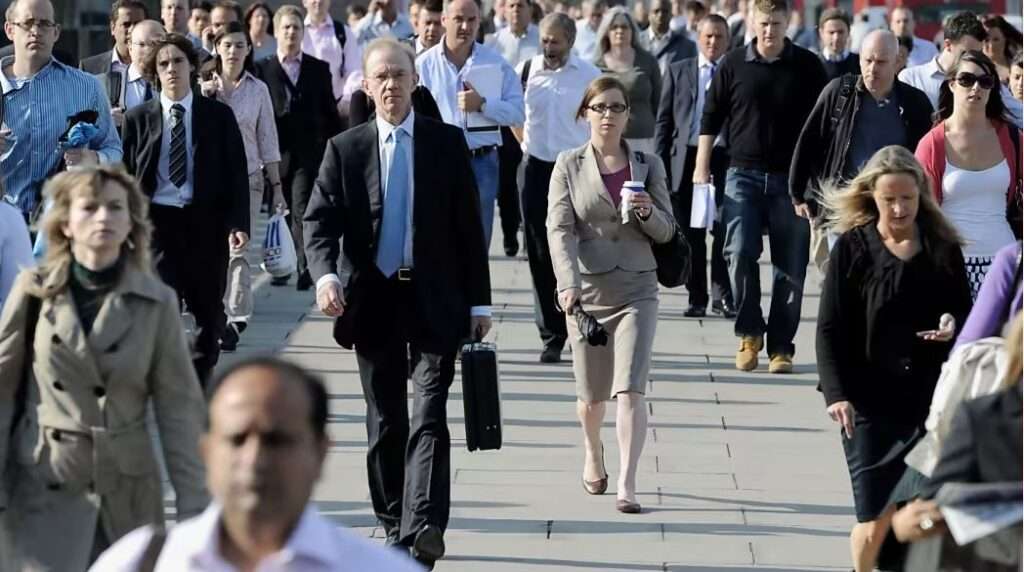Three out of four Londoners vow never to return to the office full-time

Most Londoners believe they will never return to the office full-time, a major study has found, in the latest sign that Covid has permanently changed working habits in the capital.
Three-quarters of London’s workers think they will never go back to commuting every day again, according to a study from the Policy Institute and King’s College London, with an aversion to rush-hour traveling cited as the top reason to spend more time at home.
The forecast comes as Britain’s capital faces an existential challenge following changes in workers’ behavior as few settle back into full-time office life more than two years after the first lockdown. Six in 10 London staff are still working from home at least once a week, the latest research found.
Former government adviser Mark Kleinman, a professor of public policy who worked on the study, said he was surprised that the 2,015 respondents showed such an “attachment” to home working “regardless of politics, age [and] seniority” as well as personality type, with little difference in answers between introverts and extroverts.
LONDON IS THE WORK-FROM-HOME CAPITAL OF THE WORLD
The average change in people traveling to work last week compared to pre-pandemic

The study also shows that few agree with Boris Johnson’s criticism that working from home is inefficient because people find themselves “walking very slowly to the fridge, hacking off a small piece of cheese” and forgetting what they were doing. Jacob Rees-Mogg has also voiced his “suspicions” that civil servants at home on Mondays and Fridays are only working a three-day week.
But only a small fraction of London workers share these views. Just 16pc of people agree that home workers don’t work as hard as those who commute into a workplace. Conservative voters are twice as likely to disagree than agree with that view, while Labour voters are more than six times as likely to.
Most respondents (66pc) also disagreed with the idea that employers should pay home workers less than those who go into the office, after staff at law firm Stephenson Harwood were last month told that those remaining at home must take a pay cut of 20pc.
Many bosses have already vowed to keep home-working with no loss to pay in the battle for talent. One chief executive in the legal sector, who is considering slashing office space, said he will never again tell his staff what they “must” do when it comes to going in.
However, Paul Swinney, director of policy at the Centre for Cities, said the world of work in five years might look much more similar to pre-pandemic life than people currently predict.
“There is a difference between what people’s expectations are and what we might see in reality,” he warned. “People are rational to say they don’t think they’ll do it ever again, but it’s hard to make that call. They don’t know what the world might look like in two years.”
But London-focused businesses are already adapting to a new normal. Sandwich chain Pret a Manger has been a steady indicator of office footfall in the capital throughout the pandemic but is now shifting its focus away from bankers willing to buy pricey protein pots on their way to work to cash-strapped home workers living in the suburbs.

Not all city workers have returned a Bar chart with 5 bars. Pret transactions for the week of May 26 vs pre-Covid norm
View as a data table, Not all city workers have returned
The chart has 1 X axis displaying categories.
The chart has 1 Y axis displaying 1 = pre-Covid norm. Data range from 0.87 to 1.32.
London airports London suburb London train station west EndCity of London00.20.40.60.811.21.4SOURCE: PRET INDEX/BLOOMBERG
NOT ALL CITY WORKERS HAVE RETURNED
Pret transactions for the week of May 26 vs pre-Covid norm 1 = pre-Covid norm
End of interactive chart.
From next month the city-focused chain will add cheaper items to its shelves, such as cheese twists and pastel de Natas, as it looks to compete with the likes of Greggs and expand outside of the capital.
Chief executive Pano Christou, who told Bloomberg about the plans last month, said demand in London financial hubs is as much as 80pc lower on Fridays than in the middle of the week while sales in London suburbs are higher than pre-pandemic levels and transactions in Yorkshire are soaring. Having been burnt by its “follow-the-skyscraper” strategy during Covid, the London stalwart is looking elsewhere for growth.
But people tend to enjoy coming into the office when they do so. The study published today by the Policy Institute and King’s College London shows that people feel much more connected to others when they go into a workplace.
Among those who said they are experiencing positive impacts from home working, eight in 10 cited avoiding the daily commute as a key reason for their improved circumstances.
Transport chaos in recent weeks will have put people off from going into the office, with the return to work after the Jubilee bank holiday weekend derailed by a major Tube strike on Monday. Richard Burge, boss of the London Chamber of Commerce and Industry, complained that the strike forced Transport for London to recommend that Londoners work from home, which “will only harm London’s economy”.
Although surprised by the consensus that most people regardless of age and seniority are in favor of home working, Mr. Kleinman believes London will thrive regardless of whether these behaviors turn out to last the test of time or not.
“London and other major cities have grown and prospered because of the importance of ‘agglomeration economies’ – that is, the benefits of proximity, connectivity, and serendipity, crowding together talent, ideas, meeting places, and institutions. That isn’t going to go away.”
Source: Jason Alden/Bloomberg, GWFM News

Responses